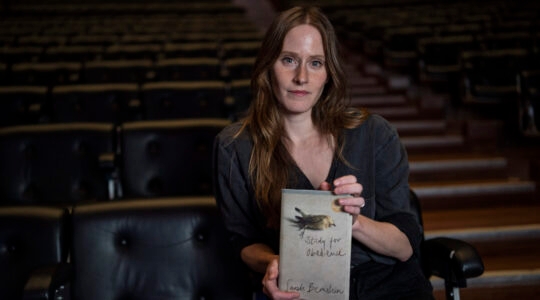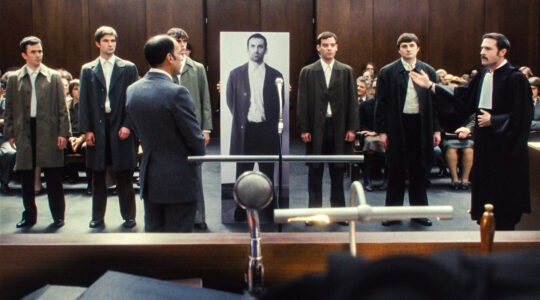One of the most interesting dynamics in the sociological framework of the Orthodox community is the different, sometimes competing roles of pulpit rabbis and rosh yeshivas/rebbeim — the rabbis who teach in day schools and yeshivas. The shorthand stereotype is that the religious instructors inside the yeshiva walls tend to be more stringent in uphold Torah teachings, while the pulpit rabbis must bend and adapt when dealing with the real-world struggles of their congregants.
True to form were Rabbi Mayer Twersky’s and Rabbi Herschel Billet’s respective responses to a recent panel discussion at Yeshiva University featuring gay Orthodox Jews talking about their struggles.
Twersky, one of Yeshiva University’s most respected rosh yeshivas, delivered a lecture in the YU beit medrash slamming the event, alarmed at what he sees as the watering down of a serious prohibition:
Not only in my lifetime, but I think in your lifetimes, there was a point where such a schmooze would have been unimaginable, inconceivable. Not only unnecessary, but inappropriate and wrong. What is there to talk about – is it a matter of public discourse?
One of the gimmel middos Bnei Yisroel is known for, rachmanim, baishanaim, gomlei chasadim – olam hazeh doma l’lailah, we need the ohr of Torah to dispel the darkness. V’Es Zachar Lo Sishkav Mishkevei Ishah To’evah Hee – sometimes we quote the posuk, but sometimes in a more sanitized version. To’evah is a very strong, jarring word – abomination. We know we are supposed to speak b’loshon nekiah, we are supposed to speak moderately, so To’evah is a very strong word. We’re no more refined than the Torah, no more moderate that the Torah. And if we adulterate, if we water down the l’shonos of the Torah, we desensitize ourselves to what the Torah is saying. If the Torah says it is a To’evah, there is no need to water down what it says, the value of what the Torah says is eternally true.
We need to make a communal cheshbon hanefesh on, not just this context, how apologetics can dull our awareness of what the Torah says. Most issurim in the Torah don’t come with such a description. And apparently the Torah says it for this effect, it is a jarring effect, and intentionally so.
Ok, but the Posuk is describing behavior – homosexual behavior. What about if we are talking about people, not behavior? How does the Torah speak to them? What’s wrong? Is there anything wrong with saying that homosexual individuals should be able to come out of the closet and be treated sympathetically, empathetically? Anytime we, Jews, bnei Avraham, Yitzchak, and Yaakov hear the word sympathy – we respond. Rachmanim, baishanim, gomlei chasadim – if you want to tug at the heartstrings of a Jew, talk to him about sympathy, about empathy, because a Jew responds and that’s the way it should be. The Rambam says if someone doesn’t display these middos, we have to check into him – stay away from having a shidduch with a person who doesn’t display these traits of rachmanim, baishanim, gomlei chasadim. So is it wrong, maybe it isn’t wrong?
Mashel l’davar domeh, please forgive the crudeness of what I am about to say, it is crass and crude. What if someone will come and ask us for a forum for someone who has a tremendous lust for his neighbor’s wife, not that chas v’shalom that he has acted on it, and hopes he won’t act on it, but he has a tremendous lust for his neighbor’s wife. He wants to come out of the closet and have people relate to him sympathetically, emphatically, and he’ll stand in front of a forum of hundreds of sincere, well-meaning people – people who were drawn in by these traits – and he’ll tell us his inclination is to “lo sachmod eishes rayecha.” And he shouldn’t be isolated from other people, there should be a club. We’ll find a euphemistic description for the club – b’chomdim Ishei Reyehu. What should our reaction be? One of revulsion! If he’ll tell us, “but it’s natural, but I’m wired that way” – does that diminish the revulsion one iota? There is sympathy, which is correct, which is a core, core Jewish character trait, at the heart of who and what a Jew is. Then there is legitimization of To’evah. There is no such thing as a Jew who should be publicly identified as chomed eishes reyehu – there should be no Jew identified as having an inclination toward Mishkav Zachor. The person needs, and deserves help in struggling. I suspect that ayn hachi nami, that help and appropriate sympathy should be forthcoming. I suspect that rov, if not everyone in this room has issues: personal issues – bein adam l’atzmo, familial issues, professional struggles. Most, if not everyone has issues. Who needs to know about these issues? The people closest to us, maybe or rabbonim. Our most intimate friends and family members. No one looks to publicize to the world, to create a new class of people, a new class of Jew – there are ways of educating the public without creating a category of a “gay Jew” – even if with all the insistence, of not acting but just the inclination, what one professes to be orientation.
Billet, religious leader of Young Israel of Woodmere in Long Island’s Five Towns and past president of the Rabbinical Council of America, weighed in with an opinion piece in the Jewish Start headlined "Compassion is also a Jewish value":
As an Orthodox Jew and an ordained rabbi, I fully accept that the Torah from the very beginning endorses heterosexual relationships and forbids and condemns homosexual relationships in very strong terms. From my perspective the Halacha is unequivocal and we are duty-bound to accept it in both theory and practice.
Nevertheless, I believe that Chazal would not have wanted the story to end with this determination of what the Halacha requires of us. In addition to observing Halacha fully, we must also understand the complicated situations of human beings in non-ideal situations in the real world.
Rav Yochanan ben Zakkai instructed his five great students to “go out and see a good path to embody and a bad path to avoid.” Why should five of the greatest rabbis of the Mishnah have to “go out and see”? Why not tell them to “Go in and see”? Doesn’t the Bais Midrash contain all of the answers inside its sacred walls? The answer is that perhaps the Bais Midrash alone is insufficient if the Torah is to be a Toras Chaim! Perhaps the lessons of the Bais Midrash must be applied in a practical way to the realities of an imperfect world. An Orthodox Jew knows well what the Torah says about homosexuality. But what many of us do not know, and I believe should know, is what it is like to be a homosexual person from an Orthodox Jewish family trying to live in an Orthodox Jewish community. Unfortunately the Bais Midrash cannot teach you that. Only “going OUT and seeing” can teach you about that subject. …
I know, I know. All rosh yeshivas don’t think alike. All pulpit rabbis don’t think alike. Still.

Help ensure Jewish news remains accessible to all. Your donation to the Jewish Telegraphic Agency powers the trusted journalism that has connected Jewish communities worldwide for more than 100 years. With your help, JTA can continue to deliver vital news and insights. Donate today.





